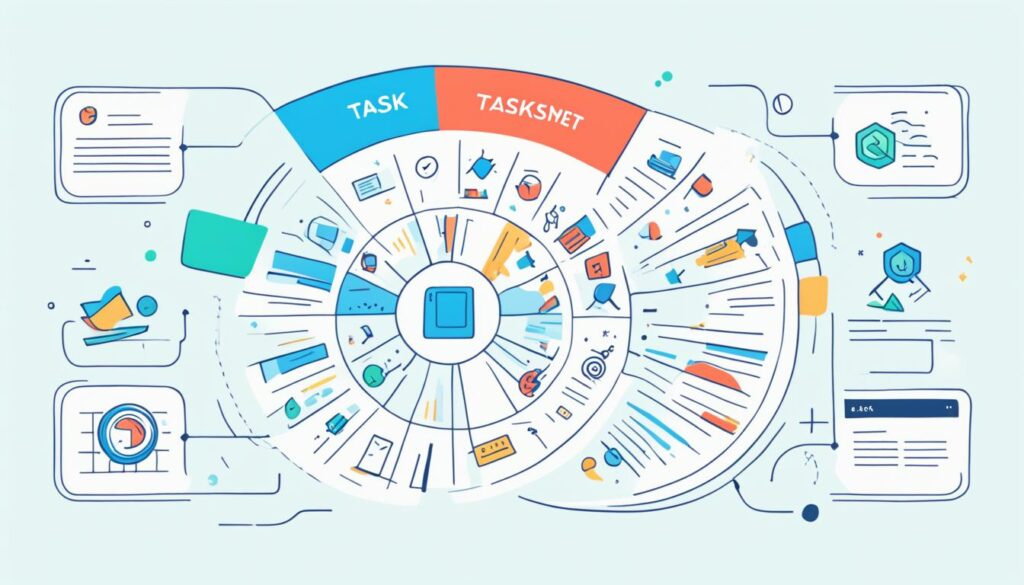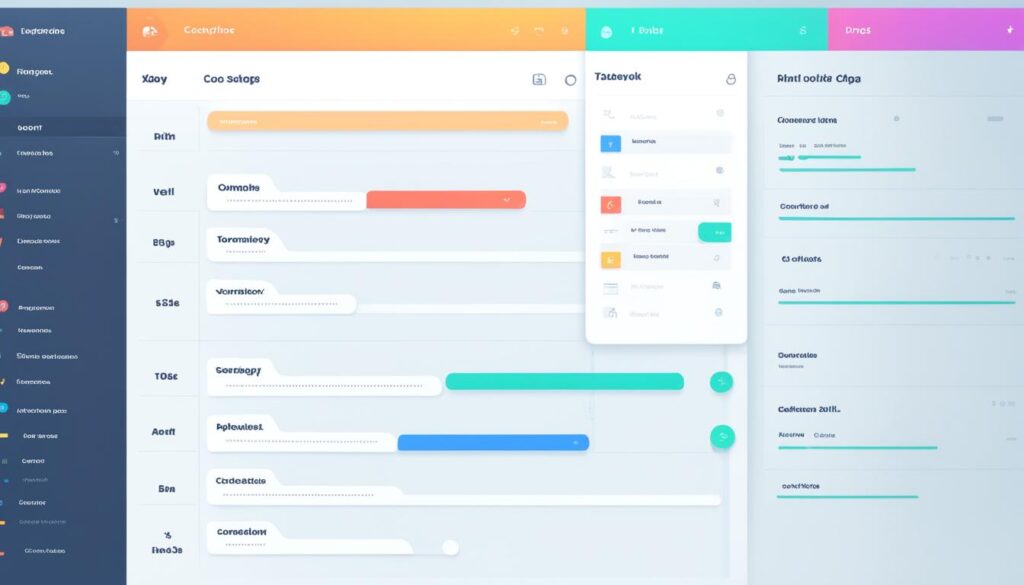The realm of efficient operations within organizations is considerably enhanced by deploying effective task management functions. In the bustling work environment, the importance of task management cannot be overstated. It facilitates the demystification of complex workflows, enabling businesses to meet and exceed their dynamic objectives seamlessly. South Africa’s growing industries recognize the paramount task management benefits that contribute to sustained productivity and strategic success.
Task management integrates the logistical elements of planning, executing, and finalizing tasks with a high degree of proficiency. Proficient management of tasks is vital in preempting potential obstacles and ensuring that all wheels within a business turn in unison, contributing to a comprehensive and efficient work canvas. Task management explained involves setting clear objectives, breaking down tasks into manageable steps, and assigning responsibilities to team members. Additionally, it requires effective communication and regular progress monitoring to ensure that tasks are being completed within the defined timeframe. Overall, successful task management is essential for maintaining productivity and achieving organizational goals.
Key Takeaways
- Task management is integral to enhancing workflow efficiency in businesses.
- Understanding task management functions can considerably diminish operational bottlenecks.
- A well-implemented task management system is crucial for achieving project deadlines.
- The benefits of task management extend to optimization of resource allocation and team coordination.
- Advanced task management tools usher in an era of improved communication and streamlined processes.
- An effective task management practice underlines the importance of task segmentation and prioritization.
Exploring the Core of Task Management
At the heart of any organization lies a fundamental need: the seamless coordination of various tasks to ensure that projects move forward efficiently. Understanding the task management purpose, its significance, and the role it plays in modern business can transform a chaotic workflow into a symphony of productivity.
The Process and Significance of Task Management
The purpose of task management is straightforward yet vital: to dissect larger, more complex projects into smaller, actionable items which can then be appropriately assigned and managed. This practice enhances the capability to navigate the complexities of project timelines, skill allocations, and the inevitable prioritization that dictates the flow of work. The significance of task management is most palpable when deadlines loom and resources are constrained; it’s in these high-stakes scenarios where effective task management becomes the linchpin of success.
Key Differences: Task Management Vs. Project Management
While the role of task management is often conflated with project management, the two disciplines serve distinct functions. Task management’s purview is the execution of individual tasks, a more micro-managerial approach as opposed to the macro, strategic oversight role that project management inhabits. This distinction is best illustrated through the lens of daily operations versus long-term objectives, with task management ensuring the former aligns seamlessly with the latter’s goals.
Challenges Faced in Task Management and Overcoming Them
Despite its importance, task management is rife with challenges. Establishing efficient workflows, maintaining real-time data and promoting collaboration can feel like an uphill battle. However, with the advent of digital solutions, these obstacles are surmountable. Below is a table outlining common task management hurdles paired with strategic solutions to overcome them.
| Challenge | Solution |
|---|---|
| Inefficient Workflows | Implementing visual planning tools for better oversight. |
| Lack of Real-time Insights | Utilizing software that provides instant updates and data analytics. |
| Collaboration Barriers | Adopting platforms that enable communication and file sharing. |
By leveraging the right tools and approaches, the role, purpose, and significance of task management are not only highlighted but are also pivotal in steering projects toward their successful completion.
What is the function of task management?
The task management function operates as the keystone to project efficiency and team coordination, harnessing the power of advanced technology to streamline operations. At its core, task management enables meticulous organization and proactive assignment of responsibilities, ensuring projects adhere to expected timelines and standards.

Understanding the task management advantages is pivotal for businesses looking to leverage productivity and innovation for a competitive edge. By facilitating seamless delegation, task management serves as a catalyst for enhanced performance, eliminating redundancy and simplifying the pursuit of project goals.
Diving deeper into the practicalities, task management critically incorporates automation to minimize time-consuming manual tasks. It is especially advantageous in scheduling and managing recurring tasks, eliminating the possibility of human error or oversight. This functional element not only conserves valuable time and resources but also allows teams to redirect focus toward more strategic undertakings.
The use of task management tools is more than a mere convenience; it is an imperative for remote and distributed teams striving to maintain communication and continuity across projects. With the rise of globalization and the increasing need for flexible work arrangements, the task management impact is profoundly evident. These tools provide a virtual round-the-clock hub where team members, regardless of location, can contribute to and monitor the ongoing progress of their shared objectives.
Moreover, the integration of task management systems within organizations serves as the linchpin for upholding an environment of transparency and accountability. The transition from the reliance on outdated methods to embracing the digital age of task organization is undeniably beneficial. In essence, the task management function is essential in not only carrying individual tasks to completion but in fostering an atmosphere where strategic planning and collaborative effort thrive.
Maximizing Workflow with Task Management Software
In today’s fast-paced business environment, the task management impact on productivity cannot be overstated. Task management software stands at the epicenter of fostering efficient and effective workflows. By incorporating advanced digital tools, businesses experience substantial task management benefits that translate into streamlined operations and improved project outcomes.

Streamlining Tasks with Digital Tools
Centralization is a key feature of task management software, playing a pivotal task management role in smoothing out the intricacies of project activities. With such tools, managers can align tasks with project goals, track progress with precision, and assist teams in navigating through demanding workflows. The emphasis on a single unified platform facilitates an environment where all members are aware of their responsibilities and deadlines, ensuring that nothing slips through the cracks.
Key Features of Efficient Task Management Software
When selecting task management software, it is crucial to consider features that propel workplace productivity. Real-time updates, cloud-based collaboration, and interactive Gantt charts are just a few functionalities that bolster the task management benefits. Functioning as the canvas of project planning, these features not only visualize the roadmap but also provide actionable insights to drive decision-making.
Task Automation and Collaboration Enhancement
Automation stands as a cornerstone of modern task management software, significantly alleviating the load on human resources. It accelerates various processes by automatic scheduling, reminders, and reporting. In terms of collaboration, the software offers a multitude of avenues for communication and coordination, enhancing the overall team dynamic. Such advancements ensure that the task management impact on achieving collective success is maximized and that the cumulative efforts lead to commendable results.
Understanding the Impact of Task Management
In an era of constant change and competition, task management stands as a fundamental pillar in the architecture of business success. Embracing the importance of task management is to recognize the direct connection between well-allocated resources, precise timing, and optimal output. To dissect the potent effects of task management is to lay bare the process that drives companies forward in South Africa and beyond.
Improving Productivity Through Effective Task Allocation
One of the critical task management advantages is the marked improvement in productivity that it facilitates. By fostering a structure that allows for sharp responses to any arising issues, managers can secure steady advancement in projects, maintaining a trajectory that aligns with the organization’s goals. Effective task allocation ensures that each team member’s time is optimized, mitigating downtime and ensuring a consistently high level of performance.
Staying on Top of Deadlines and Budget Control
Moreover, task management lends itself to superior deadline adherence and financial stewardship. With the ability to perceive how time investment translates into costs, managers wielding task management tools gain valuable insights. These, in turn, empower them to fine-tune the allocation of manpower and finances, preventing cost overruns and enabling more precise budget control—a fundamental aspect of any project’s success.
Ensuring Team Synergy and Communication Flow
At the heart of a thriving work environment is the synergy and communication flow among team members. Task management underpins this by serving as a robust channel for regular updates and vital feedback. By enhancing collaboration and establishing an environment ripe for progressive dialogue, task management becomes synonymous with building a cohesive unit that is integral to bringing projects to fruition. The significance of task management is reflected not only in operational metrics but also in the strength of the professional bonds it cultivates.







